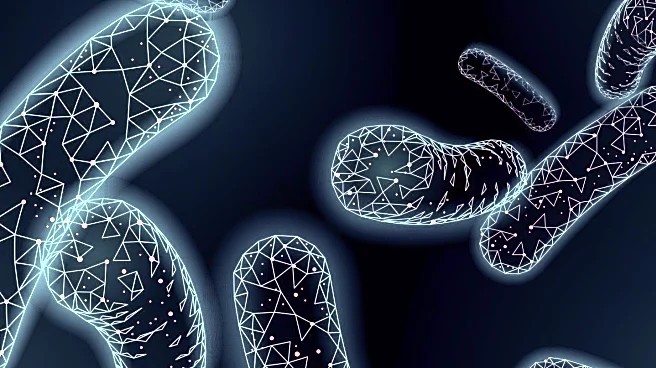What's Happening?
An international team of scientists, including researchers from the MRC Laboratory of Medical Sciences, Imperial College London, and the University of Cologne, have identified a molecule produced by bacteria associated with tumors that can enhance the effectiveness of chemotherapy. The study, published in Cell Systems, reveals that the bacteria E. coli produce a molecule called 2-methylisocitrate (2-MiCit), which improves the efficacy of the chemotherapy drug 5-fluorouracil (5-FU). The research involved large-scale screening using C. elegans and demonstrated that tumor-associated microbiomes from patients could also produce 2-MiCit. Tests on human cancer cells and a fly model of colorectal cancer confirmed the molecule's potent anti-cancer properties.
Why It's Important?
This discovery is significant as it opens new avenues for cancer treatment by leveraging the tumor-associated microbiome. The ability of 2-MiCit to enhance chemotherapy effectiveness could lead to the development of novel drugs that make existing therapies more potent. This research underscores the importance of considering the microbiome in personalized medicine, potentially leading to more effective and tailored cancer treatments. The findings highlight the complex interactions between bacteria and cancer cells, offering insights into how microbial products can be harnessed to disrupt cancer cell metabolism and improve patient outcomes.
What's Next?
The researchers plan to collaborate with medicinal chemists to modify the 2-MiCit compound, enhancing its effectiveness further. This synthetic version has already shown increased potency in killing cancer cells, indicating the potential for developing new drugs based on natural microbial products. The study's findings could lead to more personalized cancer treatments, taking into account the patient's microbiome. Future research may explore other microbial metabolites that could be used in cancer therapy, potentially revolutionizing the approach to cancer treatment.
Beyond the Headlines
The study highlights the ethical and scientific implications of using microbial products in medicine. It raises questions about the role of the microbiome in health and disease, emphasizing the need for a holistic approach to understanding human biology. The research also points to the potential for developing new classes of drugs that mimic or enhance natural microbial products, offering a sustainable and innovative approach to drug development.








